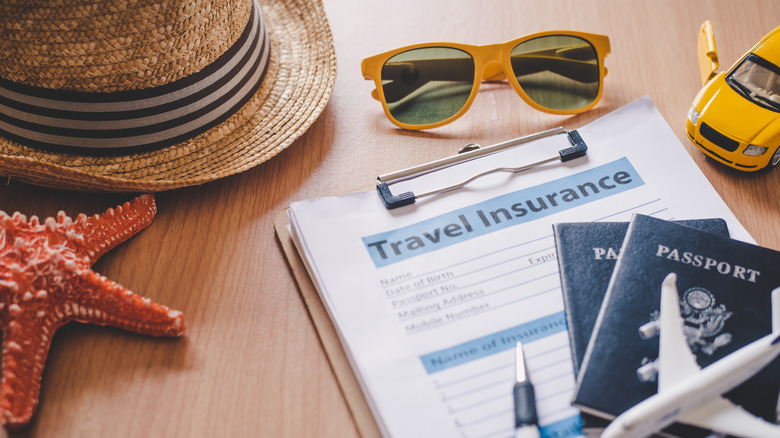Avoid Accidentally Voiding Your Trip Insurance With This One Innocent Mistake
Traveling is as unpredictable as the weather. One minute, hotels and tours are booked, then out of nowhere, an unforeseen event such as an illness or a family emergency occurs and you've got to cancel your trip. You're feeling confident because you took out travel insurance and you know how to get a refund if your flight is canceled. However, accidentally accepting airline credit instead of canceling your whole trip can void your entire travel insurance. The company may argue that you trip wasn't "canceled," and may not reimburse you for any of what you've claimed.
This happened to one innocent traveler from Minneapolis who canceled her flight after her father-in-law passed away. She accepted airline credit, so her insurance company denied her entire $4,000 claim that included other aspects of her trip. Every travel insurance policy varies, and you'll want to make sure you read the fine print. Does your travel insurance coverage include your luggage? Do you need to submit your claim within a certain time frame? These are just some examples of things to be aware of. Insurance policies are incredibly detailed, and it can feel daunting to read through everything, but it will save you time and money in the long run.
Why you should avoid buying travel insurance on trip-booking sites is just as important to know as all the nitty gritty details about canceling your trip during a less-than-ideal time. Insurance companies are not typically known for their compassion. After all, they are profit-driven businesses that looks for just that ... profit. If you are ever faced with a situation that requires you to cancel your trip, here's what you need to know so that you aren't faced with a financial burden afterwards.
You canceled your trip, but your insurance denied your claim. Now what?
In an r/americanairlines subreddit thread, u/BobNoxious123 talks about their similar situation when it came to getting reimbursed for their canceled trip. "I just had a similar conversation with my travel insurance company. To get the $$$ from the insurance (if a covered condition), I have to REFUSE the airline credit and prove I did. Then, the insurance company will refund me the paid airfare (within policy limits)."
If you don't want to get burned by your insurance company, it's best to get educated on your insurance plan policy and do not skip over the fine print, either. Firstly, if something happens, notify your insurance provider, hotel, and airline as soon as possible. The more prompt you are in contacting all the companies involved, the sooner the cancelation process can occur. Secondly, follow your policy exactly. If it mentions that all aspects of your trip must be canceled, then do so. That includes hotels, tours, flights, and do not accept a flight credit, since that will void your entire policy.
You'll also want to keep those receipts! Screenshots, call logs, emails, and everything in between. The more information you collect and have proof of, the better your chances are of having your claim accepted. Make sure to file as soon as possible, as insurance companies have very strict timelines. And if your claim is denied? Contact the insurance's underwriter, as they are a separate entity. You can also contact your state's department of insurance or commerce if you feel the outcome is unfair.
Other mistakes to avoid when it comes to travel insurance
More so than not, people tend to wait until the very last minute to purchase travel insurance when they should be booking it as soon as the trip is confirmed. Purchasing a good travel insurance plan is like someone being there to have your back when things go awry. If by chance your trip gets canceled, or flight schedules change that hinder your booking, travel insurance is there to help.
Failing to declare any underlying conditions, such as heart disease or diabetes, may void your travel insurance if you need medical assistance. In some cases, to save a few dollars, people may hide their health ailments to avoid paying a premium on their travel insurance. If you do get sick abroad, it's not only helpful for you to ensure that you get the help you require, but it helps medical staff and personnel manage the situation properly.
Pay close attention to the details and make sure you fully understand your travel insurance policy when traveling. If you're like me and like to add some adrenaline to your trips (motorcycle riding in foreign countries is my preferred activity), you'll want to make sure that your insurance policy covers you, as some policies may deny your claim if you were involved in dangerous, unsafe, or risky activities.


